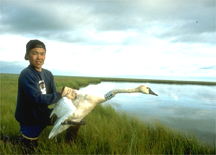
Intertribal GIS Council (IGC).
The Intertribal GIS Council and the USGS, through its support of the Federal Geographic Data Committee (FGDC), will again be a co-sponsor and plan in the development of the 2001 IGC Annual Conference. The FGDC has co-sponsored this event for the last several years and plans to continue these efforts in the future. Upcoming activities with the IGC include: an updated directory of GIS courses and programs offered at Tribal Colleges and Universities; creating scholarship and student intern programs; and an updating of Tribal boundaries in coordination with the Environmental Protection Agency and the FGDC. Contact, Bonnie Gallahan, 703-648-6084, bgallahan@usgs.gov
Updating Tribal Boundary Maps.
The EPA, the USGS (through its support of the Federal Geographic Data Committee) and the Intertribal GIS Council will explore opportunities to update tribal boundary maps through an existing MOU. Contact: Bonnie Gallahan, 703-648-6084, bgallahan@usgs.gov
Coordination on Crime Mapping.
The Bureau of Indian Affairs (BIA), the National Native American Law Enforcement Association (NAALEA), and USGS, through its support of the Federal Geographic Data Committee (FGDC), are coordinating for the upcoming NAALEA Annual Conference and will include presentations on FGDC, crime mapping, and updates on the National Institute of Justice. Opportunities will be explored to institutionalize GIS and crime mapping into the BIA's Police Academy. Contact: Bonnie Gallahan, 703-648-6084, bgallahan@usgs.gov
Coordination on GIS Training.
The National Oceanic and Atmospheric Administration, and the U.S. Fish and Wildlife Service, National Conservation Training Center, in cooperation with the Federal Geographic Data Committee will implement partnership concepts by developing workshops and professional training sessions to encourage Tribal geographic data coordination. Courses are being developed at both locations in metadata and GIS for tribal entities. Contact: Bonnie Gallahan, 703-648-6084, bgallahan@usgs.gov
National States GIS Council (NSGIC).
In cooperation with the Federal Geographic Data Committee, the NSGIC will plan and develop regional workshops to help train Tribes and States on GIS and metadata. The training will include presenters or materials from NASA, the Inter-Tribal GIS Council, and other Tribal entities. Contact: Bonnie Gallahan, 703-648-6084, bgallahan@usgs.gov
Hydrologic Issues--Michigan Tribes.
USGS staff met with Keweenaw Bay Indian Community environmental staff to discuss developing flow models for several basins within Tribal lands. USGS staff also met with representatives of the Lac Vieux Desert Band of Lake Superior Chippewa in 2000 to discuss water quality sampling and water budget analysis of the Lac Vieux Desert Basin. USGS and each Tribe hope to forge bi-lateral agreements in FY2001. Contact: Tom Weaver, 906-786-0714, tlweaver@usgs.gov
Monitoring Wisconsin Lakes.
The St. Croix Chippewa Tribe and the USGS are discussing the possibility of adding two lakes of interest to the Tribe to the USGS' Lakes Monitoring Program. Information gathered through this program would help the Tribe make sound land and water management decisions. Contact: Dale Robertson, 608-821-3867, dzrobert@usgs.gov
Brine Research in Oklahoma.
USGS representatives met with representatives of the Osage Nation and the Bureau of Indian Affairs to present results of a USGS ground-water project on the Osage Nation and to discuss a proposed petroleum production research site. A suitable site has been found that would afford an excellent opportunity to study geochemical, hydrological, and biological processes of an old brine disposal site. Contact: William J. Andrews, 405-810-4416, wandrews@usgs.gov
Coordination with the Iowa Tribe of Oklahoma.
USGS personnel met with Tribal staff of the Iowa Tribe of Oklahoma's Office of Environmental Services at Tribal Headquarters in Perkins, Oklahoma, to discuss upcoming projects involving water-quality sampling with the Tribe. Contact: William J. Andrews, 405-810-4416, wandrews@usgs.gov
Geographic Information Systems Cooperation.
USGS hydrologists from the Oklahoma District met with a representative of the Cheyenne and Arapaho Tribes of Oklahoma to discuss a cooperative project involving geographic information systems. Contact: William J. Andrews, 405-810-4416, wandrews@usgs.gov
Pesticides in the Yakama Basin.
In FY 2001, the USGS plans to research osprey diets and nest locations as part of studies arising from continuing concerns about pesticide residues in fish on the lands of the Confederated Tribes and Bands of the Yakama Indian Nation. Identification of these factors is intended to lead to measurement of organochlorine pesticides residues in resident fish and in eggs of fish-eating birds. Contact: Greg Fuhrer, 503-251-3231, gjfuhrer@usgs.gov
